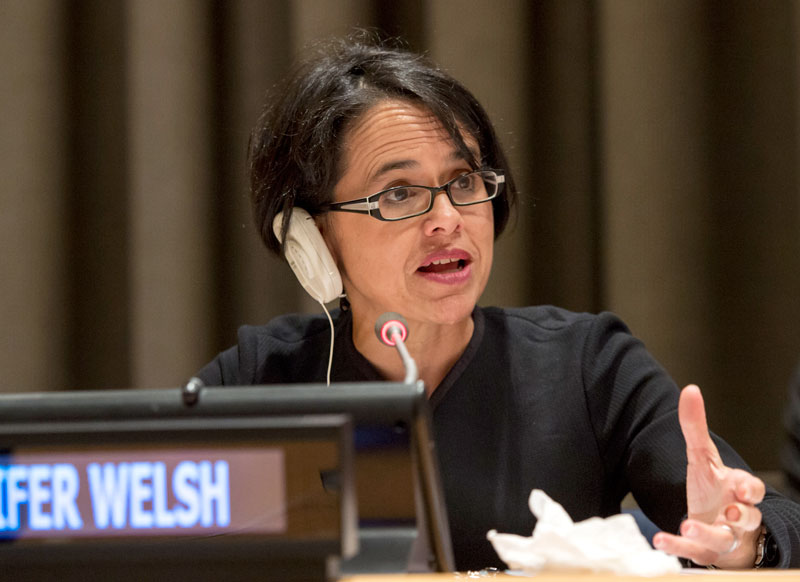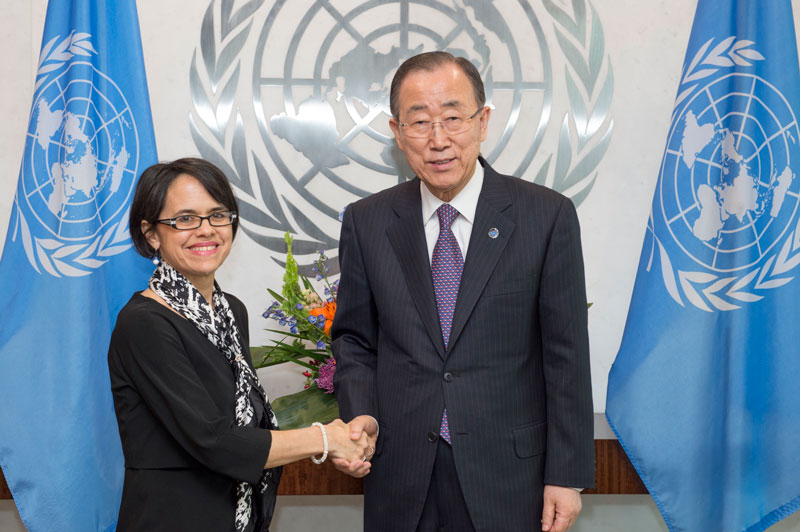Growing up in Regina, Jennifer Welsh (BA’87) was proud of her Métis ancestry. It pleased her to know that her great-grandfather was a buffalo hunter—one of the last in Saskatchewan. She was also fascinated by great world events far beyond her ancestral prairie: the nuclear arms race, the Camp David Accords, the Iran hostage crisis. She was invited to Oxford as a Rhodes Scholar, where she was studying in 1989 when the Berlin Wall came down. She travelled there to witness history being made firsthand—a galvanizing experience that began a lifetime of work abroad, consulting, teaching and writing about international relations.
An author of many influential books and papers, she was special adviser to United Nations Secretary-General Ban Ki-moon on the responsibility to protect. She co-founded the Oxford Institute for Ethics, Law and Armed Conflict and has taught international relations at the University of Toronto, McGill and Central European University in Prague. Currently she teaches at the European University Institute in Florence, Italy, where she lives with her husband and two children.
Welsh, who is a recipient of the college's Alumni of Influence Award, returned to Saskatoon last fall as the 2016 Massey lecturer, her proud parents in the audience. In a recent telephone interview from her office in Florence, she discussed her Massey experience and Canada’s role on the rapidly evolving global stage. A condensed and edited version of the conversation follows.
It’s too bad we can’t do this interview in person there in Florence. Everyone must envy your storybook Italian locale.
Yes, it’s good. However, the little secret I will share with you is that it rains here more than people realize. The weather is beautiful, but it does rain.
Ok, I’m trying really hard to feel sorry for you. Right now in your old college town the snow is piled literally halfway up the office windows after a prairie blizzard. How do you remember your time here?
While I was doing my BA, I had a part-time job in the evenings two nights a week at the StarPhoenix in the classified advertising department. I used to walk across from campus when it was the height of winter. I would have my parka on and no skin showing at all, walking across the very windy bridge. I remember Place Riel and walking through the tunnel, and all of the clubs down there at the beginning of the year to sign up people, and of course going to Louis’. And all the relationships—I still have many friends from the U of S.
In your 2004 book At Home in the World: Canada’s Global Vision for the 21st Century, you write about how as a kid growing up in Regina you loved social studies best. You’re still doing them today. You really embrace the big picture. In your very macro line of work, you can be asked to comment on conceivably anything.
Right. And it fits my personality. I chose international relations partially because it is like that. It is very interdisciplinary and looks at very interconnected trends. It is not a micro field.
In your 2016 Massey Lectures and book, The Return of History: Conflict, Migration and Geopolitics in the 21st Century, you absolutely delivered the big picture. You address the whole globe at one go. And your clear-minded talks seemed to arrive at a moment when many of us found ourselves desperate to understand a world suddenly turning on its head. You made the world make sense even if you didn’t make it any more…
…Comfortable? Exactly. It’s interesting, because only some of this was really apparent when I came up with the idea. Certainly the whole Trump phenomenon, the scale of the refugee crisis had not really surfaced. But it was one of those instances where I caught a wave.
Your Massey appearances gave tremendous clarity to so many. What did you get back from the process, from the audiences that came to hear you?
First, travelling the country in a condensed period of time reminds you how big it is. But in terms of the audience, the Q&A is a really special experience. In fact, I think I probably preferred it to giving the lecture itself. Because there is so much engagement from people of all ages. That’s what’s so interesting about the Masseys. They aren’t at university campuses. They aren’t all to young students. It is a cross section of the public, and they are in public places. People really made me think—I took a lot back from them. If I was to do a revision of the book I think that those conversations on the road would shape it a lot.

There is one person whose opinion of your work it would be fun to know and that is Francis Fukuyama. He famously argued that western liberal democracy was the last, best word in human government and marked what he called “the end of history.” Your Return of History really takes him apart.
It is very important not to caricature what Fukuyama wrote. It is actually deeply layered and very wise. The central piece of the thesis, which he can still hold to, and which I think we should still continue to debate, is that even though liberal democracy is under siege, there is no alternative big idea. Whereas in the 20th century we had rival big ideas: communism, fascism, nationalism. So his claim, you might say, is on the ropes. But where is the rival idea that commands widespread acceptance?
As you argue in both At Home in the World and The Return of History, liberal democracies are not just under siege but being stressed from within, in part by the sheer political complacency of their own citizens, including Canada. What can typical nine-to-five folks realistically do to engage with these very macro, geopolitical forces?
I would ask Canadians, “When was the last time you contacted your MP, or talked to your MLA, raised concerns or asked them about key pieces of legislation they were involved in?” That level of engagement is absolutely crucial. In this era where there has been a lot of disillusionment with politics, I think the population has thrown the baby out with the bathwater, has thought, well, these [politicians] are all people who don’t listen to the population, have their own interests and can’t be voices for change.
In At Home in the World, about Canada on the global stage, you argued that our best role is simply to lead by example, to be a model citizen in all areas. The New York Times recently ran a column headlined “Canada: Leader of the Free World,” lauding our approach to refugees, among other things. Politics aside, our profile seems a lot higher lately.
We do have a lot of soft power right now in terms of the values the political leadership is espousing. But I think we need to be careful. I don’t think Canadians are built differently or have a superior moral compass. We are not living in geographic proximity to where some of these refugee crises are taking place. I would ask how would we have responded if we were Turkey or Lebanon.
As we speak, a worrying trickle of migrants are illegally crossing our border not far away in Manitoba, more in upstate New York, and declaiming as refugees. How should Canadians regard these arrivals?
There is an immediate reaction we have that this isn’t fair. There is a process, and you are not using it. I think that is a natural human emotion. But we need to look at the empirical evidence that exists. I was recently at the Munich Security Conference and someone from the International Organization for Migration said that since the early 1980s there have been roughly three million refugees that have entered legally into the U.S.A., and according to his findings not a single one had committed a terrorist act. That is not to dismiss people’s concerns. But we have to separate out the fear… and look at what the data actually shows.
So far we’ve hardly discussed Donald Trump, and that’s probably a good thing. Though it is early days, and the 45th President of the United States is utterly a wild card, any thoughts for Canadians on dealing with him?
I watched the inauguration speech and I was very surprised at my reaction. I actually cried. I wept when I listened to it. I thought, what a dark, dark picture of America this man is painting, this dystopia, this broken country, the carnage he referred to, the rusted out factories and the declining military. I thought, this isn’t the America that I see. And really, for all of my Canadianness, I felt in that moment that the U.S. has such wonderful citizens and is a very important and honourable country. And yet here is this dystopia. It is so counterproductive, so corrosive. So many Canadians are saying, “Look at that mess in the U.S.A., what a horrible place, I’d never want to live there.” No! We have to talk about what are the valuable, positive things there. We have to find a way of countering the dystopia.
You wept watching a political speech. You’ve written about weeping with relief in the streets of Montreal after the Quebec referendum announcement in 1995, of Brexit’s bitter aftertaste for you. You take this stuff personally, don’t you?
I made my daughter watch Hillary’s concession speech, which was also very emotional. Here is this woman who has invested her entire life…. And the class act she was in defeat, that she could say to all these young people—young women—that it is all worth it. So I said to Ellie, who had just turned 10, “This is how we should try and be when we lose.”
So yes, I guess I take these things personally. As much as international relations is about big, macro things, it’s always about people, these individual people who are affected. When Donald Trump was painting his dark picture, all I could think about were all of my American friends, people who have such great values.

Your line of work has kept you abroad for two-thirds of your adult working life. Do you still get to Lumsden Beach (Sask.)?
Every summer. We will be there in July for a couple of weeks.
How long will you live in Italy?
That’s the million-dollar question. Because of the nature of the job I have, we cannot stay permanently, much as we enjoy it. We will either move to the U.K. or Canada.
Have you considered coming back here and running for prime minister?
[laughs] I don’t think there is going to be an opening for a long time. I’ve thought a lot over the years, trying to figure out what my role is. And people asked me during the Massey Lectures, why aren’t you more of an activist or why aren’t you in politics. I think we try to find the role where we use our talents best. What I’ve always loved to do, and love to do with my students, is to help them to think, to share ideas and get them to question. That’s why I like what I am doing now.
Jennifer Welsh’s Massey Lectures are available on iTunes. Her book based on the series, The Return of History: Conflict, Migration and Geopolitics in the 21st Century, is published by House of Anansi Press.